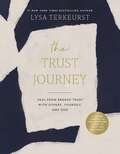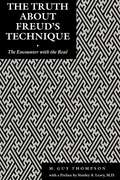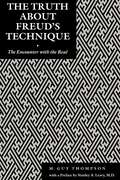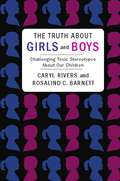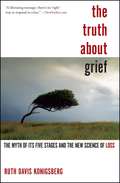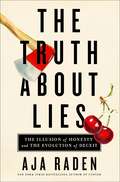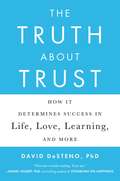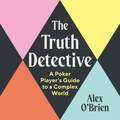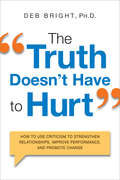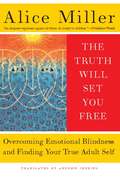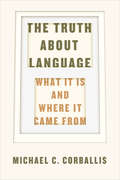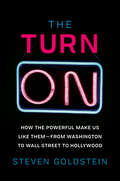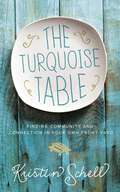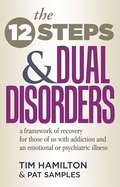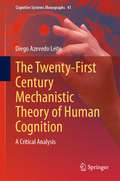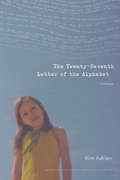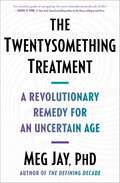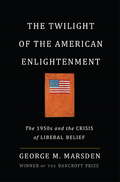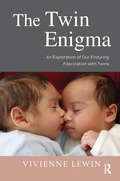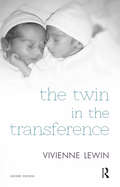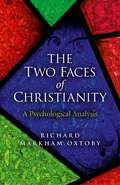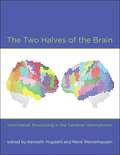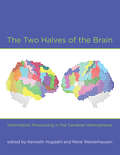- Table View
- List View
The Trust Journey: Heal from Broken Trust with Others, Yourself, and God (A Guided Journal to Use Alongside I Want to Trust You, but I Don’t)
by Lysa TerKeurstHaving your trust broken can be life-altering, but it doesn&’t have to be life-ruining. New York Times bestselling author Lysa TerKeurst knows what it&’s like to struggle with trust issues. In The Trust Journey, she walks alongside you and shows you what to do when you're skeptical of others, doubtful of your own discernment, and afraid of what God will allow next. Through these pages, she offers practical advice and biblical wisdom so you can heal from past betrayals and find new strength and resilience.The Trust Journey is a full-color, guided companion to help you explore your personal trust issues and unpack crucial concepts from I Want to Trust You, but I Don't. Lysa is also sensitive to the fact that distrust is sometimes the wisest choice to make in some relationships, but it shouldn't be the only choice we make in all of our relationships. It's time to know the joy of moving into new seasons with fresh hope and better tools to build and keep healthier relationships.Because I Want to Trust You, but I Don't is a book that needs to be processed and not just read, Lysa intentionally created this resource for you to be prayerful, self-reflective, and honest with yourself and God. Throughout the interactive portions of this journal, you will:Recognize when a fractured relationship can and cannot be repairedUnderstand what you need in your relationships to feel safe enough to trustIdentify which of the eleven relational red flags are stirring up distrustWrestle through your questions around why God allows hard things to happenUnpack the physical, emotional, and neurological impact of the betrayals you've experiencedReestablish confidence in your own discernment and start healing from the inside out Each chapter includes:Journaling questions—Lysa will ask specific questions to help you reflect, explore, process, write about, and implement what you're learning.An experiential response—an out-of-the-box, creative exercise for dealing with trust issues.Key quotes from the book and fresh insights from Lysa to help you further unpack the message.Bible verses—wisdom from God's Word.A hope-filled playlist—worship songs chosen to accompany your journaling or worship.Guided prayers—short prayers from Lysa to get you started in giving everything you're struggling with over to God.Beautiful and inspiring photos that are personally meaningful to Lysa.
The Truth About Freud's Technique: The Encounter With the Real (Psychoanalytic Crossroads #5)
by Michael Guy ThompsonIn this unusual and much-needed reappraisal of Freud's clinical technique, M. Guy Thompson challenges the conventional notion that psychoanalysis promotes relief from suffering and replaces it with a more radical assertion, that psychoanalysis seeks to mend our relationship with the real that has been fractured by our avoidance of the same. Thompson suggests that, while avoiding reality may help to relieve our experience of suffering, this short-term solution inevitably leads to a split in our existence. M. Guy Thompson forcefully disagrees with the recent trend that dismisses Freud as an historical figure who is out of step with the times. He argues, instead, for a return to the forgotten Freud, a man inherently philosophical and rooted in a Greek preoccupation with the nature of truth, ethics, the purpose of life and our relationship with reality. Thompson's argument is situated in a stunning re-reading of Freud's technical papers, including a new evaluation of his analyses of Dora and the Rat Man in the context of Heidegger's understanding of truth. In this remarkable examination of Freud's technical recommendations, M. Guy Thompson explains how psychoanalysis was originally designed to re-acquaint us with realities we had abandoned by encountering them in the contest of the analytic experience. This provocative examination of Freud's conception of psychoanalysis reveals a more personal Freud than we had previously supposed, one that is more humanistic and real.
The Truth About Freud's Technique: The Encounter With the Real (Psychoanalytic Crossroads)
by Michael Guy ThompsonIn this unusual and much-needed reappraisal of Freud's clinical technique, M. Guy Thompson challenges the conventional notion that psychoanalysis promotes relief from suffering and replaces it with a more radical assertion, that psychoanalysis seeks to mend our relationship with the real that has been fractured by our avoidance of the same. Thompson suggests that, while avoiding reality may help to relieve our experience of suffering, this short-term solution inevitably leads to a split in our existence. M. Guy Thompson forcefully disagrees with the recent trend that dismisses Freud as an historical figure who is out of step with the times. He argues, instead, for a return to the forgotten Freud, a man inherently philosophical and rooted in a Greek preoccupation with the nature of truth, ethics, the purpose of life and our relationship with reality. Thompson's argument is situated in a stunning re-reading of Freud's technical papers, including a new evaluation of his analyses of Dora and the Rat Man in the context of Heidegger's understanding of truth. In this remarkable examination of Freud's technical recommendations, M. Guy Thompson explains how psychoanalysis was originally designed to re-acquaint us with realities we had abandoned by encountering them in the contest of the analytic experience. This provocative examination of Freud's conception of psychoanalysis reveals a more personal Freud than we had previously supposed, one that is more humanistic and real.
The Truth About Girls and Boys: Challenging Toxic Stereotypes About Our Children
by Rosalind Barnett Caryl RiversCaryl Rivers and Rosalind C. Barnett are widely acclaimed for their analyses of women, men, and society. In The Truth About Girls and Boys, they tackle a new, troubling trend in the theorizing of gender: that the learning styles, brain development, motivation, cognitive and spatial abilities, and "natural" inclinations of girls and boys are so fundamentally different, they require unique styles of parenting and education.Ignoring the science that challenges these claims, those who promote such theories make millions while frightening parents and educators into enforcing old stereotypes and reviving unhealthy attitudes in the classroom. Rivers and Barnett unmake the pseudoscientific rationale for this argument, stressing the individuality of each child and the specialness of his or her talents and desires. They recognize that in our culture, girls and boys encounter different stimuli and experiences, yet encouraging children to venture outside their comfort zones helps them realize a multifaceted character. Educating parents, teachers, and general readers in the true nature of the gender game, Rivers and Barnett enable future generations to transform if not transcend the parameters of sexual difference.
The Truth About Grief
by Ruth Davis KonigsbergThe five stages of grief are so deeply imbedded in our culture that no American can escape them. Every time we experience loss--a personal or national one--we hear them recited: denial, anger, bargaining, depression, and acceptance. The stages are invoked to explain everything from how we will recover from the death of a loved one to a sudden environmental catastrophe or to the trading away of a basketball star. But the stunning fact is that there is no validity to the stages that were proposed by psychiatrist Elisabeth Kübler-Ross more than forty years ago. In The Truth About Grief, Ruth Davis Konigsberg shows how the five stages were based on no science but nonetheless became national myth. She explains that current research paints a completely different picture of how we actually grieve. It turns out people are pretty well programmed to get over loss. Grieving should not be a strictly regimented process, she argues; nor is the best remedy for pain always to examine it or express it at great length. The strength of Konigsberg's message is its liberating force: there is no manual to grieving; you can do it freestyle. In the course of clarifying our picture of grief, Konigsberg tells its history, revealing how social and cultural forces have shaped our approach to loss from the Gettysburg Address through 9/11. She examines how the American version of grief has spread to the rest of the world and contrasts it with the interpretations of other cultures--like the Chinese, who focus more on their bond with the deceased than on the emotional impact of bereavement. Konigsberg also offers a close look at Kübler-Ross herself: who she borrowed from to come up with her theory, and how she went from being a pioneering psychiatrist to a New Age healer who sought the guidance of two spirits named Salem and Pedro and declared that death did not exist. Deeply researched and provocative, The Truth About Grief draws on history, culture, and science to upend our country's most entrenched beliefs about its most common experience.
The Truth About Lies: The Illusion of Honesty and the Evolution of Deceit
by Aja RadenWhy do you believe what you believe?You’ve been lied to. Probably a lot. We’re always stunned when we realize we’ve been deceived. We can’t believe we were fooled: What was I thinking? How could I have believed that?We always wonder why we believed the lie. But have you ever wondered why you believe the truth? People tell you the truth all the time, and you believe them; and if, at some later point, you’re confronted with evidence that the story you believed was indeed true, you never wonder why you believed it in the first place. In this incisive and insightful taxonomy of lies and liars, New York Times bestselling author Aja Raden makes the surprising claim that maybe you should.Buttressed by history, psychology, and science, The Truth About Lies is both an eye-opening primer on con-artistry—from pyramid schemes to shell games, forgery to hoaxes—and also a telescopic view of society through the mechanics of belief: why we lie, why we believe, and how, if at all, the acts differ. Through wild tales of cons and marks, Raden examines not only how lies actually work, but also why they work, from the evolutionary function of deception to what it reveals about our own.In her previous book, Stoned, Raden asked, “What makes a thing valuable?” In The Truth About Lies, she asks “What makes a thing real?” With cutting wit and a deft touch, Raden untangles the relationship of truth to lie, belief to faith, and deception to propaganda. The Truth About Lies will change everything you thought you knew about what you know, and whether you ever really know it.
The Truth About Trust
by David DestenoWhat really drives success and failure? Can I trust you? It's the question that strikes at the heart of human existence. Whether we're talking about business partnerships, romantic relationships, child-parent bonds, or the brave new world of virtual interaction, trust, when correctly placed, is what makes our world spin and lives flourish. Renowned psychologist David DeSteno brings together the latest research from diverse fields, including psychology, economics, biology, and robotics, to create a compelling narrative about the forces that have shaped the human mind's propensities to trust. He shows us how trust influences us at every level, from how we learn, to how we love, to how we spend, to how we take care of our own health and well-being. Using cuttingedge research from his own lab, he also unlocks, for the first time, the cues that allow us to read the trustworthiness of others accurately. Appealing to readers of Dan Ariely, Dan Gilbert, and David Eaglemen, The Truth About Trust offers a new paradigm that will change not only how you think about trust, but also how you understand, communicate, and make decisions in every area of your life.
The Truth About Trust
by David Desteno"This one's worth reading. Trust me." --Daniel Gilbert, PhD, bestselling author of Stumbling on Happiness Issues of trust come attached to almost every human interaction, yet few people realize how powerfully their ability to determine trustworthiness predicts future success. David DeSteno's cutting-edge research on reading trust cues with humanoid robots has already excited widespread media interest. In The Truth About Trust, the renowned psychologist shares his findings and debunks numerous popular beliefs, including Paul Zak's theory that oxytocin is the "moral molecule." From education and business to romance and dieting, DeSteno's fascinating, paradigm-shifting book offers new insights and practical takeaways that will forever change how readers understand, communicate, and make decisions in every area of life.t will change not only how you think about trust, but also how you understand, communicate, and make decisions in every area of your life.
The Truth About Trust: How It Determines Success in Life, Love, Learning, and More
by David Desteno"This one's worth reading. Trust me." --Daniel Gilbert, PhD, bestselling author of Stumbling on Happiness Issues of trust come attached to almost every human interaction, yet few people realize how powerfully their ability to determine trustworthiness predicts future success. David DeSteno's cutting-edge research on reading trust cues with humanoid robots has already excited widespread media interest. In The Truth About Trust, the renowned psychologist shares his findings and debunks numerous popular beliefs, including Paul Zak's theory that oxytocin is the "moral molecule." From education and business to romance and dieting, DeSteno's fascinating, paradigm-shifting book offers new insights and practical takeaways that will forever change how readers understand, communicate, and make decisions in every area of life.
The Truth Detective: A Poker Player’s Guide to a Complex World
by Alex O'BrienFrom uncertainty and risk to ambiguity, emotion and non-verbal behaviour, life can be like a game of poker. So approach it like one, with every day critical thinking.In The Truth Detective, journalist and competitive poker player Alex O'Brien shows how we can survive and make better life decisions using the rules of the game. In a world full of uncertainty and incomplete information, this is a book about getting to the truth.You'll meet a host of experts who break down the science of navigating a time in which fact and fiction are becoming increasingly hard to tell apart. With psychological research and insight from a range of professionals - from FBI agents and behavioural economists to poker aces and bounty hunters - O'Brien assembles strategies we can use to analyse the information that surround us in our day to day.Tackle life like a poker player and let The Truth Detective guide your through the jungle of disinformation - and on to success in the game of life.
The Truth Doesn't Have to Hurt: How to Use Criticism to Strengthen Relationships, Improve Performance, and Promote Change
by Deb BrightNobody likes criticism. Handled poorly, it too often stings and breeds resentment--and most of us try to avoid it at all costs. But criticism--crafted carefully and communicated skillfully--promotes trust and respect, motivates individuals, and serves as a catalyst for change. It has the ability to turbocharge workplaces and careers. If that sounds far-fetched, it's because few understand how to properly give and receive the kind of critical feedback that brings positive results. The Truth Doesn't Have to Hurt rejuvenates this powerful but neglected art form. Executives, managers, team leaders--anyone who needs to temper praise with a dose of reality--will learn to: Deliver the truth and have it taken as helpful * Create an atmosphere of acceptance * Avoid mistakes that sabotage an exchange * Control how they receive criticism so they benefit--even if it's badly presented Ignoring problems or always saying nice things will only maintain the status quo. This research-backed book delivers proven techniques and tools for motivating people and triggering improvement--swiftly and painlessly.
The Truth Will Set You Free: Overcoming Emotional Blindness and Finding Your True Adult Self
by Alice MillerMore than twenty years ago, a little-known Swiss psychoanalyst wrote a book that changed the way many people viewed themselves and their world. In simple but powerful prose, the deeply moving Drama of the Gifted Child showed how parents unconsciously form and deform the emotional lives of their children. Alice Miller's stories about the roots of suffering in childhood resonated with readers, and her book soon became a backlist best seller. In The Truth Will Set You Free Miller returns to the intensely personal tone and themes of her best-loved work. Only by embracing the truth of our past histories can any of us hope to be free of pain in the present, she argues. Miller uses vivid true stories to reveal the perils of early-childhood mistreatment and the dangers of mindless obedience to parental will. Drawing on the latest research on brain development, she shows how spanking and humiliation produce dangerous levels of denial, which leads in turn to emotional blindness and to mental barriers that cut off awareness and the ability to learn new ways of acting. If this cycle repeats itself, the grown child will perpetrate the same abuse on later generations--a message vitally important, especially given the increasing popularity of programs like Tough Love and of "child disciplinarians" like James Dobson. The Truth Will Set You Free will provoke and inform all readers who want to know Alice Miller's latest thinking on this important subject.
The Truth about Language: What It Is and Where It Came From
by Michael C. CorballisEvolutionary science has long viewed language as, basically, a fortunate accident—a crossing of wires that happened to be extraordinarily useful, setting humans apart from other animals and onto a trajectory that would see their brains (and the products of those brains) become increasingly complex. But as Michael C. Corballis shows in The Truth about Language, it’s time to reconsider those assumptions. Language, he argues, is not the product of some “big bang” 60,000 years ago, but rather the result of a typically slow process of evolution with roots in elements of grammatical language found much farther back in our evolutionary history. Language, Corballis explains, evolved as a way to share thoughts—and, crucially for human development, to connect our own “mental time travel,” our imagining of events and people that are not right in front of us, to that of other people. We share that ability with other animals, but it was the development of language that made it powerful: it led to our ability to imagine other perspectives, to imagine ourselves in the minds of others, a development that, by easing social interaction, proved to be an extraordinary evolutionary advantage. Even as his thesis challenges such giants as Chomsky and Stephen Jay Gould, Corballis writes accessibly and wittily, filling his account with unforgettable anecdotes and fascinating historical examples. The result is a book that’s perfect both for deep engagement and as brilliant fodder for that lightest of all forms of language, cocktail party chatter.
The Turn-On: How the Powerful Make Us Like Them—from Washington to Wall Street to Hollywood
by Steven GoldsteinHow do Tiffany Haddish, Tom Hanks, Meryl Streep and Apple’s Tim Cook turn us on, and why do some other public figures drive us crazy and turn us off? And who are the behind-the-scenes gurus who help public figures turn us on or off? Steven Goldstein, a civil rights leader who has worked in politics, business and entertainment, breaks down the industry of creating likeability and how public figures manufacture likeability—and how they sometimes destroy it through scandals.As a television producer, Congressional lawyer, leader of state and national civil rights organizations, and communications advisor to corporate and political leaders, Steven Goldstein has been a mover and shaker in every sector of American power. He knows what makes public figures likeable. Based on his twenty-five years of experience and original teachings, Goldstein tells us why we like certain people, and dislike others, in politics, business, and entertainment. Why do we let some into our personal world and refuse to let others enter? Goldstein has developed a paradigm that describes how we fall in like, reminiscent of falling in love, with the public figures who shape our lives. And Goldstein names names. Why do we like Ellen DeGeneres and Morgan Freeman, yet find Gwyneth Paltrow sometimes maddening? Why do we like Warren Buffett, Microsoft’s Satya Nadella and Google’s Sundar Pichai aside from their products and profits? And apart from our ideology, why do some of us like Barack and Michelle Obama and others Donald Trump, and what does Ben Franklin have to do with any of it? Goldstein identifies eight traits of likeability that every public figure reveals to us in pairs, with each pair deepening our relationship with that person. The pairs are: Captivation and HopeAuthenticity and RelatabilityProtectiveness and ReliabilityPerceptiveness and CompassionGoldstein not only tells us how we fall in like with public figures, but he also reveals the behind-the-scenes players in politics, business and entertainment who shape who we like. Likeability isn’t just something you have or you don’t. Likeability can be manufactured—and it can be destroyed. Public figures can be their own worst enemies in saying or doing things that turn us off. Why do we forgive some but not others?The Turn-On will make you think twice about a celebrity reinvention, a glamorous media appearance or a perfectly crafted speech, and will give you tools to take control of your own likeability and become more like your favorite star.
The Turquoise Table: Finding Community and Connection in Your Own Front Yard
by Kristin SchellA simple way to connect your neighborhood, your community and build friendships. Are you consumed with a busy life but unsure how to slow down? Do you desire connection within your community and think, “Absolutely, but I don’t have time for that” or “I can’t create that”? What if there was another way through it all, a way to find those moments of peace and to create a time for honest, comfortable connection? What if meeting neighbors and connecting with friends was as simple as showing up and being available?Desperate for a way to slow down and connect, Kristin Schell put an ordinary picnic table in her front yard, painted it turquoise, and began inviting friends and neighbors to join her. Life changed in her community and it can change in yours, too. Alongside personal and heartwarming stories, Kristin gives you: Stress-free ideas for kick-starting your own Turquoise TableSimple recipes to take outside and share with othersStories from people using Turquoise Tables in their neighborhoodsEncouragement to overcome barriers that keep you from connectingNew ways to view hospitality Today, Turquoise Tables are inviting individuals to connect with each other in nearly all fifty states and seven countries. Ordinary people like you wanting to make a difference right where they live.Community and friendship are waiting just outside your front door.
The Twelve Steps And Dual Disorders: A Framework Of Recovery For Those Of Us With Addiction & An Emotional Or Psychiatric Illness
by Pat Samples Tim HamiltonA gentle, spiritual and supportive approach to bolster our recovery, The Twelve Steps and Dual Disorders provides an adaptation and discussion of each of the Twelve Steps of Dual Recovery Anonymous.With compassion and encouragement, this book helps us to begin and strengthen our recovery from our addictions and emotional or psychiatric illnesses. A gentle, spiritual and supportive approach to bolster our recovery, The Twelve Steps and Dual Disorders provides an adaptation and discussion of each of the Twelve Steps of Dual Recovery Anonymous.
The Twenty-First Century Mechanistic Theory of Human Cognition: A Critical Analysis (Cognitive Systems Monographs #41)
by Diego Azevedo LeiteThis book presents a theoretical critical appraisal of the Mechanistic Theory of Human Cognition (MTHC), which is one of the most popular major theories in the contemporary field of cognitive science. It analyses and evaluates whether MTHC provides a unifying account of human cognition and its explanation. The book presents a systematic investigation of the internal and external consistency of the theory, as well as a systematic comparison with other contemporary major theories in the field. In this sense, it provides a fresh look at more recent major theoretical debates in this area of scientific research and a rigorous analysis of one of its most central major theories. Rigorous theoretical work is integrated with objective consideration of relevant empirical evidence, making the discussions robust and clear. As a result, the book shows that MTHC provides a significant theoretical contribution for the field of cognitive science. The content is useful for those interested in theoretical and empirical issues concerning major theories in the contemporary field of cognitive science.
The Twenty-Seventh Letter of the Alphabet: A Memoir (American Lives)
by Kim AdrianClear-sighted, darkly comic, and tender, The Twenty-Seventh Letter of the Alphabet is about a daughter’s struggle to face the Medusa of generational trauma without turning to stone. Growing up in the New Jersey suburbs of the 1970s and 1980s in a family warped by mental illness, addiction, and violence, Kim Adrian spent her childhood ducking for cover from an alcoholic father prone to terrifying acts of rage and trudging through a fog of confusion with her mother, a suicidal incest survivor hooked on prescription drugs. Family memories were buried—even as they were formed—and truth was obscured by lies and fantasies. In The Twenty-Seventh Letter of the Alphabet Adrian tries to make peace with this troubled past by cataloguing memories, anecdotes, and bits of family lore in the form of a glossary. But within this strategic reckoning of the past, the unruly present carves an unpredictable path as Adrian’s aging mother plunges into ever-deeper realms of drug-fueled paranoia. Ultimately, the glossary’s imposed order serves less to organize emotional chaos than to expose difficult but necessary truths, such as the fact that some problems simply can’t be solved, and that loving someone doesn’t necessarily mean saving them.
The Twentysomething Treatment: A Revolutionary Remedy for an Uncertain Age
by Meg JayThe author of The Defining Decade explains why the twenties are the most challenging time of life and reveals essential skills for handling the uncertainties surrounding work, love, friendship, mental health, and more during that decade and beyond.There is a young adult mental health crisis in America. So many twentysomethings are struggling—especially with anxiety, depression, and substance use—yet, as a culture, we are not sure what to think or do about it. Perhaps, it is said, young adults are snowflakes who melt when life turns up the heat. Or maybe, some argue, they&’re triggered for no reason at all. Yet, even as we trivialize twentysomething struggles, we are quick to pathologize them and to hand out diagnoses and medications. Medication is sometimes, but not always, the best medicine. For twenty-five years, Meg Jay has worked as a clinical psychologist who specializes in twentysomethings, and here she argues that most don&’t have disorders that must be treated: they have problems that can be solved. In these pages, she offers a revolutionary remedy that upends the medicalization of twentysomething life and advocates instead for skills over pills. In The Twentysomething Treatment, Jay teaches us: -How to think less about &“what if&” and more about &“what is.&” -How to feel uncertain without coming undone. -How to work—at work—toward competence and calm. -How to be social when social media functions as an evolutionary trap. -How to befriend someone and why this is more crucial for survival than ever. -How to love someone even though they may break your heart. -How to have sex when porn is easier and more available. -How to move, literally, toward happiness and health. -How to cook your way into confidence and connection. -How to change a bad habit you may not know you have. -How to decide when so much about life is undecided. -How to choose purpose at work and in love. The Twentysomething Treatment is a book that offers help and hope to millions of young adults—and to the friends, parents, partners, teachers, and mentors who care about them—just when they need it the most. It is essential reading for anyone who wants to find out how to improve our mental health by improving how we handle the uncertainties of life.
The Twilight of the American Enlightenment: The 1950s and the Crisis of Liberal Belief
by George MarsdenIn the aftermath of World War II, the United States stood at a precipice. The forces of modernity unleashed by the war had led to astonishing advances in daily life, but technology and mass culture also threatened to erode the country’s traditional moral character. As award-winning historian George M. Marsden explains in [Title TK], postwar Americans looked to the country’s secular, liberal elites for guidance in this precarious time, but these intellectuals proved unable to articulate a coherent common cause by which America could chart its course. Their failure lost them the faith of their constituents, paving the way for a Christian revival that offered America a firm new moral vision-one rooted in the Protestant values of the founders. A groundbreaking reappraisal of the country’s spiritual reawakening, [Title TK] shows how America found new purpose at the dawn of the Cold War.
The Twin Enigma: An Exploration of Our Enduring Fascination with Twins
by Vivienne LewinThe book offers a unique in-depth understanding of the twin relationship, and the way in which twin development is affected by our attitudes to twins and our enduring fascination with them. It explores our historical fascination with this subject and the origins of this excitement, how our perceptions of twins reflect our own longing for a perfect soul-mate, and the effect this personal projection has on the development in twins. It is a book written with the general reader in mind rather than "experts". Twins share a deep psychic bond that forms the core of their twinship, but they are never identical. Many factors will affect their development, including the early mutual resonances and sensate experiences between them, and parental and societal attitudes in raising them.
The Twin in the Transference: Second Edition
by Vivienne LewinThe universal phantasy of having a twin originates in our earliest relational experiences. This book is about twins and twinning processes. The existence of an actual twin, alive or dead, may be experienced as an embodiment of the phantasy of having a twin, with developmental consequences. Twinning processes in twins lead to the creation of an internal twin relationship that is enduring. The twin relationship may be at the narcissistic end of the spectrum leading to an enmeshed twinship, or it may be a more mature object relationship. All twin relationships will be manifest in the transference relationship with the analyst. The twin transference has been largely neglected in the psychoanalytic literature, to the detriment of our understanding of dynamic processes in twin patients. In this book, case material is used to explore the nature of the twin transference relationship and the necessity of analysing the twin transference, as well as maternal and paternal transference relationships.
The Two Faces of Christianity: A Psychological Analysis
by Richard Markham OxtobyApplying Eric Fromm's concept of the differences between Humanistic and Authoritarian religions, The Two Faces of Christianity proposes that Christianity consists of two distinctly different religions which co-exist under the same verbal label. The ethical teachings of that inspired Jewish religious genius, Jesus of Nazareth which has traditionally been believed to be the core around which the religion of Christianity has been built, constitute a Humanistic Religion. In many parts of the Christian Church the tenets of that religion have all but disappeared under the spreading influence of the salvation theology of St Paul and his fellow-travellers. Examination of the guilt-ridden mind of St Paul, to whom the authorship of nearly half of the 27 books of the New Testament has been attributed, throws revealing light on how this process has taken place. Paul&’s notoriously neurotic anxieties about sex are just one of the more striking manifestations of the psychopathology of his split personality which has been a major influence in the process by which the Humanistic religion of Jesus has been transformed into an oppressive Authoritarian one.
The Two Halves of the Brain
by Kenneth HugdahlHemispheric asymmetry is one of the basic aspects of perception and cognitive processing. The different functions of the left and right hemispheres of the brain have been studied with renewed interest in recent years, as scholars explore applications to new areas, new measuring techniques, and new theoretical approaches. This volume provides a comprehensive view of the latest research in brain asymmetry, offering not only recent empirical and clinical findings but also a coherent theoretical approach to the subject. In chapters that report on the field at levels from the molecular to the clinical, leading researchers address such topics as the evolution and genetics of brain asymmetry; animal models; findings from structural and functional neuroimaging techniques and research; sex differences and hormonal effects; sleep asymmetry; cognitive asymmetry in visual and auditory perception; and auditory laterality and speech perception, memory, and asymmetry in the context of developmental, neurological, and psychiatric disorders. ContributorsKatrin Amunts, Ulrike Bayer, Alfredo Brancucci, Vince D. Calhoun, Maria Casagrande, Marco Catani, Michael C. Corballis, Patricia E. Cowell, Timothy J. Crow, Tom Eichele, Stephanie Forkel, Patrick J. Gannon, Isabelle George, Onur G nt rk n, Heikki H m l inen, Markus Hausmann, Joseph B. Hellige, Kenneth Hugdahl, Masud Husain, Gr goria Kalpouzos, Bruno Laeng, Martina Manns, Chikashi Michimata, Deborah W. Moncrieff, Lars Nyberg, Godfrey Pearlson, Stefan Pollmann, Victoria Singh-Curry, Iris E. C. Sommer, Tao Sun, Nathan Swanson, Fiia Takio, Michel Thiebaut de Schotten, Ren Westerhausen
The Two Halves of the Brain: Information Processing in the Cerebral Hemispheres
by Kenneth Hugdahl Rene WesterhausenState-of-the-art research on brain asymmetry, explained from molecular to clinical levels. Hemispheric asymmetry is one of the basic aspects of perception and cognitive processing. The different functions of the left and right hemispheres of the brain have been studied with renewed interest in recent years, as scholars explore applications to new areas, new measuring techniques, and new theoretical approaches. This volume provides a comprehensive view of the latest research in brain asymmetry, offering not only recent empirical and clinical findings but also a coherent theoretical approach to the subject. In chapters that report on the field at levels from the molecular to the clinical, leading researchers address such topics as the evolution and genetics of brain asymmetry; animal models; findings from structural and functional neuroimaging techniques and research; sex differences and hormonal effects; sleep asymmetry; cognitive asymmetry in visual and auditory perception; and auditory laterality and speech perception, memory, and asymmetry in the context of developmental, neurological, and psychiatric disorders. Contributors Katrin Amunts, Ulrike Bayer, Alfredo Brancucci, Vince D. Calhoun, Maria Casagrande, Marco Catani, Michael C. Corballis, Patricia E. Cowell, Timothy J. Crow, Tom Eichele, Stephanie Forkel, Patrick J. Gannon, Isabelle George, Onur Güntürkün, Heikki Hämäläinen, Markus Hausmann, Joseph B. Hellige, Kenneth Hugdahl, Masud Husain, Grégoria Kalpouzos, Bruno Laeng, Martina Manns, Chikashi Michimata, Deborah W. Moncrieff, Lars Nyberg, Godfrey Pearlson, Stefan Pollmann, Victoria Singh-Curry, Iris E.C. Sommer, Tao Sun, Nathan Swanson, Fiia Takio, Michel Thiebaut de Schotten, René Westerhausen
